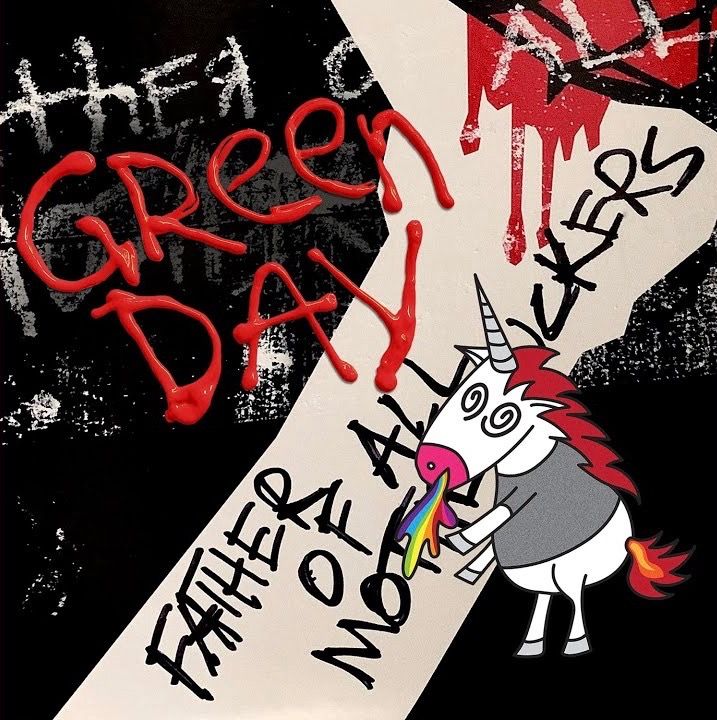Green Day brings nothing new to the table on ‘Father of All…’

Green Day
Father of All…
Reprise Records· February 7, 2020
If anybody enters Green Day’s thirteenth album Father of All… with expectations of it matching the rugged material from their earlier days, this album would not be their cup of tea. Think of it as just another alternative pop-punk band working to keep the old-school streak of revelation alive, and it may just be passable.
With this being Green Day’s shortest running time in an album, the twenty six minutes are swaddled with angst, riot, and jabs at present-day state of affairs. “Father of All…” introduces the album, with an energetic guitar solo providing a charming throwback to the rock n’ roll nostalgia the band were always known for. But it is when the vocals kick in that the track goes awry. With the studio effects making Billie Joe Armstrong’s vocals out to be indistinguishable, they resultantly takeaway from the track, and when the lyrics are tied in, they only succeed in wearing out the rebellious early 2000s facade of troubled love while not offering a fresh perspective.
The segway into “Fire Ready Aim” is so subtle it could easily be missed. The track blends in with the preceding song, as they are far too similar. The lyrics lack substance, with repetitive backing vocals overtaking the track. The intentions are surely there, with Green Day explaining the song is about their “daily outrage.” The thing is, it has been done before.
It’s only once the third track, “Oh Yeah,” is reached that Armstrong’s vocals surface more, and they ring with the familiar assertion of Green Day. The track is catchy, buoyant, and concurrently solemn, as Billie Joe sings with the pride of being the “shooting star of lowered expectations.” The track, which also samples a portion of Joan Jett’s song “Do You Wanna Touch Me”, touches upon America’s condition regarding gun violence, education, and social media, doing so in the most upfront way as Green Day has done in the past:
“I’m just a face in the crowd of spectators
Do the sound of the voice of the traitor
Dirty looks and I’m looking for a payback
Burning books in a bulletproof backpack.”
“Meet Me On the Roof” matches the energy as “Oh Yeah”, — fast-paced with a nice touch of groove. The song itself is far more light-hearted, serving another typical romance story of a guy hoping for a girl to lower her expectations to be his lover, perceiving himself as not having enough value. In theory the concept is endearing, but once again standard in the music industry.
Bittersweet reminiscence follows in “Teenage Teeanger,” as Armstrong reflects on what it is like growing up “ordinary.” The title serves to emphasize a teeanger as being nothing special. In Green Day’s classic lines,
Living like a prisoner for haters
I was a teenage teenager, I am an alien visitor
Of course, the humor is evident, but it seems to be all Green Day has ever done.
For a song with fairly dark lyrics, “Stab You In The Heart” is deceiving enough with its fun guitar tidbits and guitar distortion dosing the track, bringing back an almost-vintage style classic rock and serving as a solid reminder of the angry outlet the album is all about bringing.
“Sugar Youth” is hyperactive and eccentric, but does not add or detract from the album. The lyrics explore a perspective from an anxious person. Much similar to a sugar rush, the song is fast-paced and quickly comes to a close after two minutes.
“Junkies on A High” is one of the better tracks of the album, drawing the listener in with gritty, slower guitar chugging. Billie Joe takes on the perspective of a washed-up nobody, recounting in his lyrics: “Rock n’ roll tragedy, I think the next one could be me.” With the pacing and laid back feel, the track is memorable enough while successfully standing out in the album as a callback to older material.
“Take The Money and Crawl” kicks into gear, shifting from a quiet strum in the beginning to an abrupt, uplifting alteration. It brings on the illusion of wildlife, detailing the issues with money and just how inflated it is in the economy. Similar to other tracks, it also takes on an ominous message, telling the story of the narrator of the song hired to kill for personal gain, in turn receiving their end of the deal. The track’s message of wealth and power is explicit, which can be applauded.
The album ends on the note of “Graffitia,” a song highlighting the tragedies that shadow the town of Graffitia, including poor wagers, neglect, and death. It can be concluded that although musically this is not Green Day’s best work, their refusal to budge from the material and image they’re accustomed to continues to have its spark at moments.